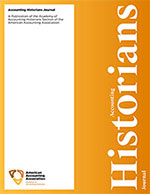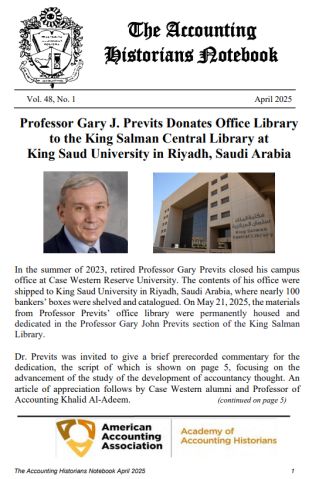By Laws
Academy of Accounting Historians
A Not-for-Profit Corporation
(To Accompany Corporate Charter)
I. Objectives
- The purpose of this not-for-profit organization, named The Academy of Accounting Historians, is to encourage research, publication, teaching and personal interchanges in all phases of accounting history and its interrelation with business and economic history including the environment within they developed.
II. Membership
- There shall be two classes of members: regular and life. The amount and type of annual dues and payment schedule will be proposed by the Board of Trustees and ratified by the membership. All members ratified shall be entitled to full voting and other privileges pertaining to The Academy.
- Any person supporting the purposes of The Academy will be enrolled as a regular member upon payment of annual dues to the Secretary or other authorized representatives of The Academy. The Board of Trustees shall have powers to regulate membership as to admission and discipline.
- Scholars of distinction in accounting history may be designated life members. Selection of such members shall be made by a committee of members and Trustees appointed by the President of The Academy and its recommendations shall be subject to approval by the Board of Trustees. Dues of life members shall not exceed fifty percent of those paid by regular members.
- A member deficient in payment of dues will be held to be "not in good standing."
III. Officers and Trustees
- The Academy shall have the following elective offices: a President, a President-Elect, two Vice-Presidents (1st Vice-President and 2nd Vice-President), a Secretary, and a Treasurer, each elected for one-year terms, commencing on the first day of January following the election.
- There shall be a Board of Trustees. The number of Trustees shall not be less than twelve or more than twenty. Such Trustees shall consist of the officers named above in Article III, Section 1, and members elected by the general membership as nominated in Article III, Section 3. The terms of office of Trustees who are not officers shall be three years with at least two Trustees to be elected each year. The details of initial election and technique for intial succession are to be designated by the President serving at the time of incorporation. In any event, a Trustee should stand for election at least once each three years, excepting past presidents. Each retiring President of the Academy shall, upon election of his successor, become a member of the Board of Trustees for a term of three years. The president may appoint an interim Trustee to fill a vacancy created by the departure of any Trustee during the Trustee's term of office.
- Each year the President shall designate a nomination committee of five persons. The committee shall be composed of the three most recent past presidents of The Academy and two other Academy members who shall be appointed by the President. If one or more of the most recent past presidents is unable or unwilling to serve, then the next most recent past president(s) shall be appointed. The nominating committee shall present to the membership of The Academy the nominations for the offices of President, President-Elect, Vice Presidents, Secretary, and Treasurer, and the nominations of Trustee positions to be filled. All Nominees must be members of the Academy in good standing. Nomination may also be made from the floor in accordance with Robert's Rules of Order (Newly Revised).
- Election of officers will be held at the conclusion of the annual business meeting. Proxy votes are limited to one certified proxy per member in good standing in attendance. The results of the election shall be certified and announced by the Secretary. The Secretary shall certify proxies prior to the start of the meeting.
IV. Duties of the Officers and Trustees
- The President of the Academy shall preside at all meetings of The Academy, other than meetings of the Board of Trustees. In case of the President's disability or absence, these duties shall be discharged by the President-Elect or a Vice-President according to numerical order. Standing and special committees, to include the task specification and the membership, shall be appointed by the president.
- The President-Elect and Vice-Presidents shall undertake whatever functions are deemed appropriate by the President of the Academy.
- The Secretary shall keep the records of The Academy and the minutes of the general meetings. The Treasurer shall receive and have custody of the funds of the Academy.
- The Chairman of the Board of Trustees shall be elected at an appropriate meeting of the Board of Trustees. The elected Chairman will hold that office for a term to be specified, but no longer that one three-year term, and may not serve consecutive three year terms. The Chairman will preside at meetings of the Board of Trustees. In the Absence of the Chairman of the Board of Trustees, these duties shall be discharged by the President, or alternatively by the President-Elect, or a Vice-President, according to numerical order. The Trustees shall have responsibility and authority to approve all disbursements in excess of $1,000 (price-level adjusted from August 1974, using the CPI-U index) unless otherwise authorized by special resolution of the Trustees. they may accept, renew and propose research, teaching and seminar projects in keeping with the objectives of The Academy. The Board of Trustees shall fill vacancies in the list of officers and may adopt any rules and regulations of the conduct of its business not inconsistent with these bylaws. It shall act as a committee on time and place of meetings, and perform such duties as The Academy may delegate to it. A quorum shall consist of eight Trustees, with the provision that action taken at any meeting not attended by the majority of the Trustees shall be confirmed through a majority correspondence received from the Board of Trustees.
- An adequate record of funds is to be maintained by the Treasurer. An annual report shall be prepared and reported by the Treasurer to the membership each year in an appropriate fashion. The Treasurer shall prepare an annual financial plan for presentation to the membership at the annual business meeting. An examination of the financial records will take place as deemed necessary by the Trustees.
V. Meetings
- The annual and any other meetings of The Academy shall be held at such time and place as determined by the Trustees. Notice of such time and place shall be given to members, by mail or otherwise, before such meetings unless other means of satisfactory notice can be applied. Such notice should include an agenda. A quorum at such duly called meetings shall consist of those members present or represented by appropriate proxy.
- Special meetings of The Academy may be called at such time and place as may be determined by a resolution of the Board of Trustees.
- Meetings of the Board of Trustees or the officers of The Academy shall be called by the President of the Academy or at the request of any four Trustees; all announcements of meetings shall be through the office of the Secretary.
- The program for the annual meeting of the Academy shall be the responsibility of the President. an agenda of all meetings should be reported to members at least three weeks before the annual meeting.
- For purposes of conduction all general and special meetings of the organization, Robert's Rules of Order (newly revised) will apply wherein the bylaws do not specify procedure. A parliamentarian will be appointed by the officer presiding at each meeting.
- A digest of the action taken by the Trustees during the year shall be reported at the next annual business meeting of The Academy.
VI. Amendments
- Amendments to these bylaws may be submitted at any time by any member to the President and by the President submitted to the Trustees at their next regular meeting for approval or disapproval. Amendments shall be adopted if so voted by a plurality of the membership of The Academy in attendance (Article V, Section 1), or at the discretion of the Trustees by a majority vote of all voting members through a poll by mail. Amendments shall go into effect as soon as the results of polls are approved and reported at a regular annual business meeting.
- Every member of The Academy is encouraged to submit suggestions and recommendations for the improvement and expansion of the activities of The Academy to the Trustees or the officers in writing or from the floor during meetings of The Academy.
VII. Disciplines
- The Trustees are empowered to discipline any member who has not fulfilled his obligation to advance the purposes of The Academy. In all cases the member shall be properly notified of the prospect of action against him and afforded an opportunity to present his or her position.
VIII. Selection of Directors
- The Trustees of the Academy shall select and/or elect the Directors of The Academy of Accounting Historians as incorporated under the laws of the State of Alabama, for every period as necessary, except that the initial directors for purposes of incorporation shall be S. Paul Garner, W. Baker Flowers, and Gary John Previts, all residents of the State of Alabama. The Corporate Agent must be a resident of the State of Alabama and shall be nominated by the President and approved by a majority of the Trustees voting. If for any reason the President shall fail to make a nomination or the person he or she nominates is not approved, than any Trustee may nominate a person for the position of Corporate Agent. The Agent shall represent the corporation with regard to corporate legal matters and shall serve as a Trustee.
IX. Compensation
- Officers, Trustees, Directors, and members of standing committees shall not be compensated for services. Persons employed on a wage or salary basis to perform administrative or other duties shall be governed by Article IV, Section 4.
X. Dissolution
- In the event of dissolution, the residual assets of the organization will be turned over to one or more organization which themselves are exempt as organizations described in section 501(c)(3) and 170(c)(2) of the Internal Revenue Code of 1954 or corresponding sections of any prior or future law, or to the federal, state, or local government for exclusive public purpose.
The First 40 Years of the Academy of Accounting Historians
Trace the evolution of The Academy of Accounting Historians in a three part series of papers from its founding in 1973 through the 40th Anniversary in 2013. The primary purpose of this series is to provide information about The Academy of Accounting Historians, the people who have contributed to its establishment and success, and to assist in planning our future role. All three papers were published in The Accounting Historians Journal and can be viewed by clicking the button below.
Accounting Historians Journal
 First volume was published in 1974. We publish twice a year. Older volumes are available online at AAA Digital Library
First volume was published in 1974. We publish twice a year. Older volumes are available online at AAA Digital Library
Overview of acceptable submissions:
- History of profession
- Biography
- History of accounting change
- Entity case studies: industries, companies, governmental or NFP entities
- Development of accounting theory
- Critical examinations of new or old research
- Does not have to be old to be a part of our history
Learn More
Accounting Historians Notebook
Submissions and any other Notebook editorial matters may be sent to: Yvette.Lazdowski@unh.edu
Volume 48, No. 1 is now available online!
View it here now!

